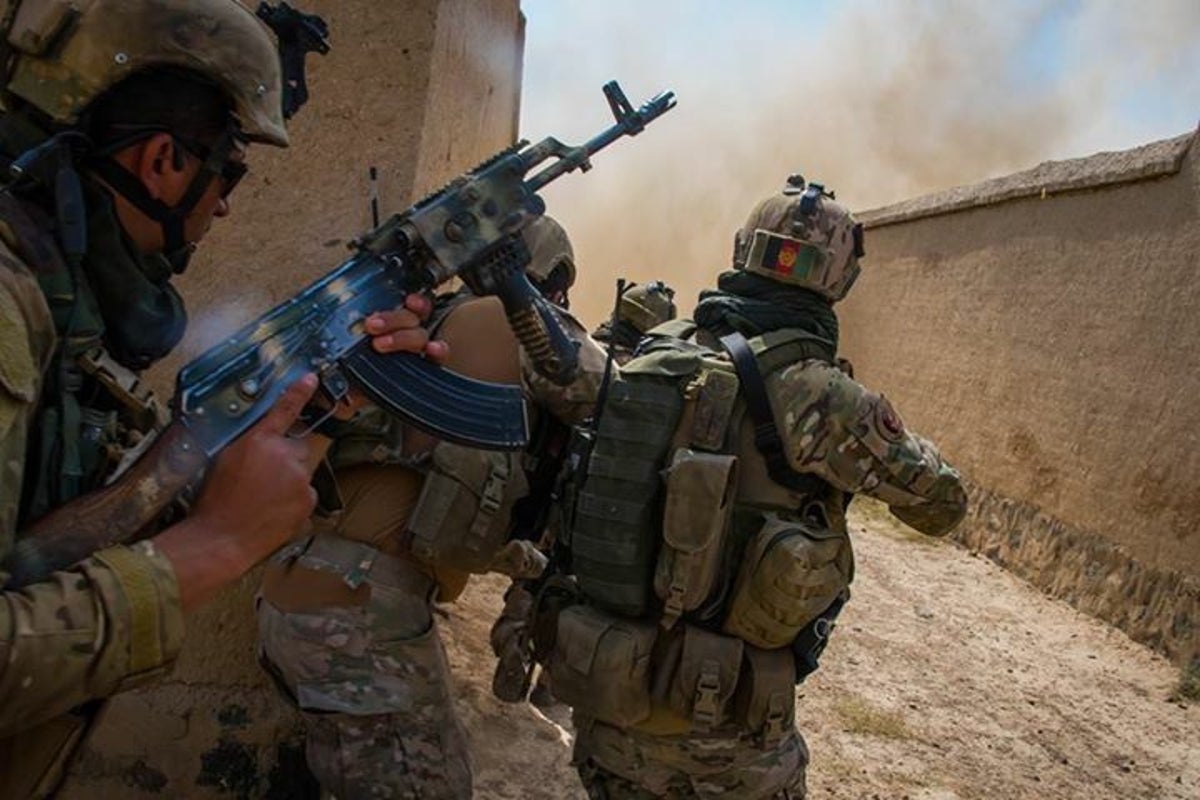
The majority of voters believe members of a British-funded Afghan special forces unit should be given sanctuary in the UK, a poll has found.
Despite being trained and paid by the UK government, many members of the two units known as “The Triples” have now been told they do not qualify for Britain’s resettlement programmes – with British Army veterans alleging their offers to provide character references were ignored by the government.
The poll comes after The Independent revealed how Rishi Sunak’s government had left the courageous soldiers at the mercy of the Taliban.
A ministerial row has broken out this week over their fate, with veterans’ minister Johnny Mercer and armed forces minister James Heappey at odds over how many of the soldiers described as “putting their lives on the line” for the UK should be brought to Britain.
Piling further pressure on Mr Sunak to act, a new YouGov poll of nearly 3,000 voters has found that the majority of the public – including 48 per cent of Tory voters – believe the Afghan veterans should be granted the sanctuary they were promised in the UK.
That compares to just 19 per cent of respondents who said they should not be allowed to settle in Britain, rising to 26 per cent among Conservative voters.
It comes after a joint investigation by The Independent, Lighthouse Reports and Sky News revealed dozens of these former commandos have been beaten, tortured or killed by the Taliban since the fall of Kabul in 2021.
Others have been forced into a life of destitution, unable to find work because they have to move location every month to escape the Taliban.
A number of the Afghan special forces personnel are now in the UK after being evacuated, or having travelled through Europe and crossed the Channel on small boats. It was also reported on Monday that 200 of the soldiers are in Pakistan facing imminent deportation back to Afghanistan.
Members of the two elite units – Commando Force 333 and Afghan Territorial Force 444 – who were left behind in Afghanistan in 2021 were told to seek help from the UK’s Arap scheme, which was established to help “Afghan citizens who worked for or with the UK government in Afghanistan in exposed or meaningful roles”.
Major General Charlie Herbert (second from right), former senior Nato adviser in Afghanistan, with 444 members in Kandahar in 2018— (Supplied )
Major General Charlie Herbert, a senior Nato adviser in Afghanistan between 2017 and 2018, previously told The Independent: “I can think of no other Afghan security forces who were more closely aligned to the UK than 333 and 444, nor who more loyally or bravely supported our military objectives.”
Many of the elite Afghan soldiers were given character references by British military colleagues, but claims have now been reported that some who offered to do so were never contacted by the Arap team or Ministry of Defence.
One former British soldier, named Alex, told the BBC: “I provided details about the individual that I served with on the ground in Afghanistan to the Arap team and never got a response.
“I am aware of a number of other people who served alongside the Triples and never received any contact from the MoD or Arap. The cases were all rejected in the first place and were then rejected on appeal.”
“We talk a lot about veterans and their mental health,” he added. “To think that you’ve left these people behind, you hear what they’re going through. They were looking after you on the ground and you can’t help them.”
While Mr Heappey, the armed forces minister, defended the government’s record to MPs on Monday, bemoaning “the reality of how hard it is to verify the service of those who just served in the unit rather than explicitly alongside UK personnel”.
But Alex said: “It makes me so angry, particularly to hear the minister say that it’s hard to verify these people, when they’ve clearly made no attempt to verify them, not even reaching out to their own people.”
A Government spokesperson said: “The UK government has made an ambitious and generous commitment to help eligible people in Afghanistan. So far, we have brought around 24,600 people to safety, including thousands of people eligible for our Afghan schemes.
“Each ARAP application is assessed individually and in accordance with published policy, and we do not automatically make a decision on eligibility based on a job role.”







